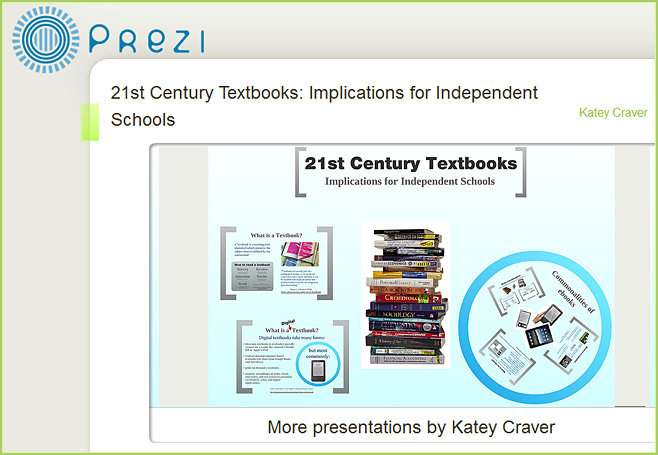Also see:
- Mag+ Tablet Publishing Tools Now Available for All Publishers — from Mag+
- Bonnier Gives Away Its New iPad Magazine Builder — from paidcontent.co.uk
Also see:
SENSUS and Open Exhibits – Easy Sharing Between Tables, Tablets & Phones — from ideum.com by Jim Spadaccini
.
The concept is simple:
Make networking and sharing transparent across
multitouch devices and operating systems.
.
From DSC:
Even more powerful if such a file could be quickly sent/shared with a remote classroom/student!
GoTo Meeting, Centra, Wimba, and other web conferencing solutions…be afraid, be very afraid — from Kaplan EduNeering by Karl Kapp
Excerpt:
PowerPoint is slowly starting to broaden its capabilities and will, I predict, soon infringe on some well known software applications in the field of e-learning such as…web conferencing tools (and others).
This video is one of the first inroads PowerPoint is making into the Web Conferencing software and I don’t think they are going to stop here.
Will it be PowerPoint 2014 with full capabilities and robust conferencing, when will they announce a more robust authoring capability? Will PowerPoint ever be SCORM compliant…..?
Evernote – some great ideas for using it in education — from David Andrade
From DSC:
In my recent class at Capella University, one of the last discussion board questions asked:
What a great question! My answer was yes, as it makes sense to me to guide educational reform by what is best for the students…for learning. Hopefully, we can make informed decisions. Though I’ve learned that there is no silver bullet when it comes to learning theories, each learning theory seems to be a piece of the puzzle for how we learn. Graphically speaking:
If viewing the above graphic on the Learning Ecosystems blog (vs. in an RSS feed/reader):
You may need to right-click on the above image and save it, then open it.
Such theories should have a place when policies are drafted, when changes are made. But I don’t often hear reference to the work of Thorndike, Bandura, Vygotsky, Gagne, Kolb, etc. when legislative bodies/school boards/or other forms of educational leadership are exploring future changes, directions, strategies. What is it that these people were trying to relay to us? What value can we gleam from them when we form our visions of the future? How does their work inform our selection of pedagogies, tools, organizational changes?
Using screen capture software to improve student learning — from Faculty Focus by Rob Kelly
By using podcasts, vodcasts, and screen capture software to provide supplemental and remedial materials, instructors can focus on higher-order learning activities during class, says Dave Yearwood, associate professor and chair of the Technology Department at the University of North Dakota. In an email interview with The Teaching Professor, Dr. Yearwood shared some ideas for getting started.
Apple iPad 2 ‘sold out’ — from telegraph.co.uk
Analysts at Piper Jaffray and Deutsche Bank claim the Apple iPad 2 is now totally sold out after its Friday launch, with 70% sold to new purchasers
iPad 2 Sold Out, 70% Went to New Buyers — from Mashable.com by Stan Schroeder
Also see:
Tablet devices: iPad takes over as the lecture hall aid of choice — from ft.com by Tim Bradshaw

.
Originally saw this at xplana.com.
In 2006, CLEAR launched its “Rich Internet Applications for Language Learning” initiative. Web-based tools were designed to offer functionality that is beneficial to language learning, while exploring how technology can enhance language teaching. This article discusses the design principles behind the RIA initiative, explains how the tools are intended to be used, and shares some examples of classroom use.
.
From DSC:
The article mentions tools such as Wimba (now a part of Bb Collaborate), VoiceThread, and others.
Textbook publisher announces ‘app’ approach to learning materials — from The Chronicle by Jeff Young
Long Beach—The phrase “there’s an app for that” may be coming to textbooks.
Today a major textbook company, Cengage Learning, announced a new e-textbook publishing platform that lets professors plug in apps, some made by other software companies, to add to traditional textbook content features like tutoring services or the ability to trade margin notes with other students.
The system is called MindTap, and it is scheduled to be announced at the annual TED conference here. When Chris Vento, Cengage’s executive vice president for technology and development, explained the system to a reporter, he felt the need to put the word “textbook” in air quotes, since traditional textbook content is a small part of the new product. These digital textbooks essentially bundle together several products sold by Cengage and its subsidiaries, including their electronic test-bank system, called Aplia, as well as videos and other materials that the company owns the rights to, including the archives of Newsweek. And MindTap allows professors to customize the presentation of the material, by adding their own slides, video lectures, articles, or free online content from elsewhere.